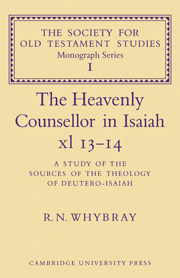Book contents
- Frontmatter
- Contents
- Acknowledgements
- Abbreviations
- Introduction
- I The context
- II Detailed interpretation
- III Literary characteristics
- IV Israelite kings and their councils
- V The origin of the divine council
- VI The assembly of the gods in Canaan
- VII The council of Yahweh in Israel
- VIII Yahweh and his advisers
- IX The office of counsellor
- X The divine counsellor in Babylonian myth
- XI Summary and conclusions
- Index of biblical references
- Index of authors cited
VI - The assembly of the gods in Canaan
Published online by Cambridge University Press: 08 March 2010
- Frontmatter
- Contents
- Acknowledgements
- Abbreviations
- Introduction
- I The context
- II Detailed interpretation
- III Literary characteristics
- IV Israelite kings and their councils
- V The origin of the divine council
- VI The assembly of the gods in Canaan
- VII The council of Yahweh in Israel
- VIII Yahweh and his advisers
- IX The office of counsellor
- X The divine counsellor in Babylonian myth
- XI Summary and conclusions
- Index of biblical references
- Index of authors cited
Summary
Although the concept of an assembly of the gods is clearly attested in the Canaanite sources, whose relevance to the study of the background of Israelite religion is generally admitted, the nature of the evidence is unfortunately far from clear. The only detailed information comes from the Ugaritic texts, whose interpretation is seriously disputed. Consequently it is by no means certain how absolute the power of the king of the gods was held to be.
The positions of both El and Baal are ambiguous. On the one hand, El is regularly referred to as ‘king’; he receives homage from the other gods, and it appears that no important step can be taken without his consent. Yet he is susceptible to bullying by other gods, and his authority can be flouted and his council intimidated. On the other hand, Baal, who in the one passage which describes a full council meeting ‘stands by El’, presumably in a subordinate position, yet can be hailed as king elsewhere.
This dispute, or at least ambiguity, over the question of the holder of the office of king does not in any way cast doubt on the existence of the office itself, but it provides no information about the proper functions of the council in relation to those of the king. In as far as El's position is threatened, the threat comes from gods who seek to replace him. The conflicts between the gods can, therefore, not be used to interpret their normal functions as members of El's council.
- Type
- Chapter
- Information
- The Heavenly Counsellor in Isaiah xl 13-14A Study of the Sources of the Theology of Deutero-Isaiah, pp. 37 - 38Publisher: Cambridge University PressPrint publication year: 1971



